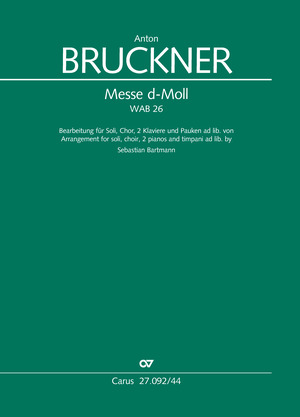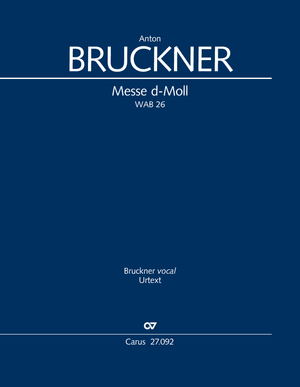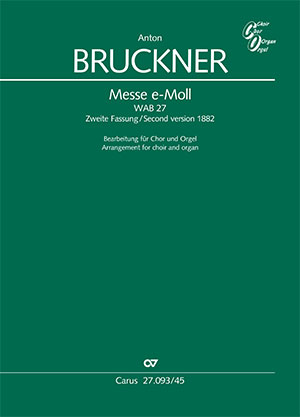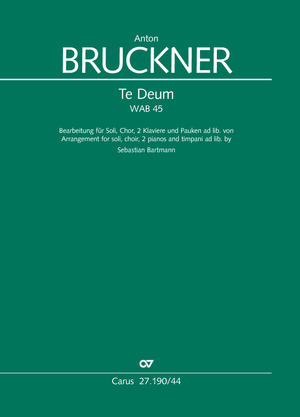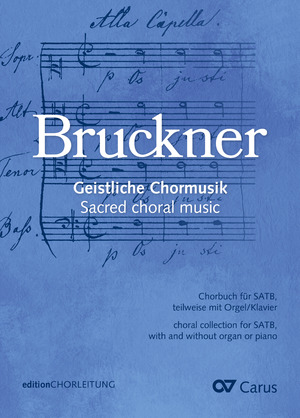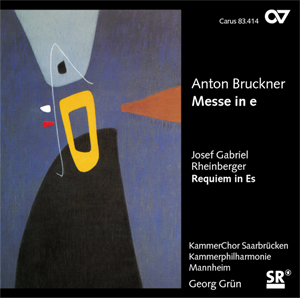Mass in D minor
Arrangement for soli, choir and 2 pianos and timpani ad lib (arr. S. Bartmann) WAB 26
In the 19th and early 20th centuries, transcriptions of large (choral) symphonic works for two pianos were extremely popular, as they enabled a large audience to get to know classical compositions in an age before recorded music. In many cases, world-famous pieces were first performed in such a version – including Bruckner’s Te Deum.
The Stuttgart composer, pianist and experienced piano-duo performer Sebastian Bartmann was commissioned by the Landesakademie für die musizierende Jugend in Baden-Württemberg Ochsenhausen to newly arrange Bruckner’s Te Deum and the Mass in D minor for soloists, choir, and two pianos. A timpani part (ad libitum) provides additional color. The arrangements are based on the original Carus editions. The vocal scores and choral scores of the original version can also be used.
While Bruckner’s symphonic approach becomes evident for the first time in the Mass in D minor from 1864, the work does not place the same high demands on the performers as the two later masses. This arrangement for soloists, choir and 2 pianos has an air of transparency, rather like a work of chamber music.
| Original version | Arrangement for two pianos |
| Soli SATB, Coro SATB, 2 Fl, 2 Ob, 2 Clt, 2 Fg, 2 Cor, 2 Tr, 3 Trb, Timp, 2 Vl, Va, Vc, Cb, Org | Soli SATB, Coro SATB, 2 Pfte, [Timp] |
-
Composer
Anton Bruckner
| 1824-1896Anton Bruckner wurde 1824 in Ansfelden (Österreich) geboren und hatte kein sonderlich einfaches Leben. Der österreichische Komponist stammte aus einfachen, ländlichen Verhältnissen und wurde ein Leben lang von Selbstzweifeln geplagt. Nach dem Tod seines Vaters wurde er im Alter von 13 Jahren als Sängerknabe im Stift Sankt Florian aufgenommen. Nach mehreren Jahren als Schulgehilfe und einem autodidaktischem Orgel- und Klavierstudium arbeitete er zunächst als Organist in Sankt Florian. 1855 wurde er als Domorganist in Linz eingesetzt. Nach einer Einführung in Musiktheorie und Instrumentation durch Simon Sechter und Otto Kitzler, entdeckte Bruckner Richard Wagner als künstlerisches Vorbild, den er zeit seines Lebens bewunderte und auch mehrfach in Bayreuth besuchte.
1868 wurde Anton Bruckner Professor für Generalbass, Kontrapunkt und Orgel am Konservatorium in Wien, zehn Jahre später Hoforganist. 1891 bekam er schließlich einen Ehrendoktor der Wiener Universität. Er galt als wichtiger Orgelvirtuose seiner Epoche, seine kompositorische Anerkennung ließ jedoch auf sich warten. Erst die zwischen 1881 und 1883 entstandene Symphonie Nr.7 in E-Dur mit dem unter dem Eindruck von Wagners Tod entstandenen berühmten Adagio brachte die erhoffte Anerkennung, auch wenn er sie angesichts seiner Tendenz zur Skepsis und Selbstkritik nicht wahrhaben wollte.
Anton Bruckner war ein Einzelgänger, der sich keiner Schule oder Lehrmeinung anschließen wollte. Er schrieb sowohl geistliche als auch weltliche Werke in all ihren Facetten. Neben zahlreichen Motetten komponierte Bruckner drei Messen, die Missa Solemnis b-Moll (1854) und das beim Carus-Verlag erhältliche Te Deum (1881–84; CV 27.190/00). Als Symphoniker schrieb er von 1863 an insgesamt neun Symphonien und viele symphonische Studien, wobei er dazu neigte, fertige Fassungen mehrfach zu überarbeiten. Bruckners Orchesterwerke galten lange als unspielbar, waren aber lediglich für die Tonsprache ihrer Zeit ungewöhnlich kühne, die Traditionen von Beethoven über Wagner bis zur Volksmusik vereinende Klangmonumente an der Grenze von Spätromantik und Moderne. Personal details
-
Arranger
Sebastian Bartmann
| 1979
Frequent questions about this work
 There are no questions and answers available so far or you were unable to find an answer to your specific question about this work? Then click here and send your specific questions to our Customer Services!
There are no questions and answers available so far or you were unable to find an answer to your specific question about this work? Then click here and send your specific questions to our Customer Services!


